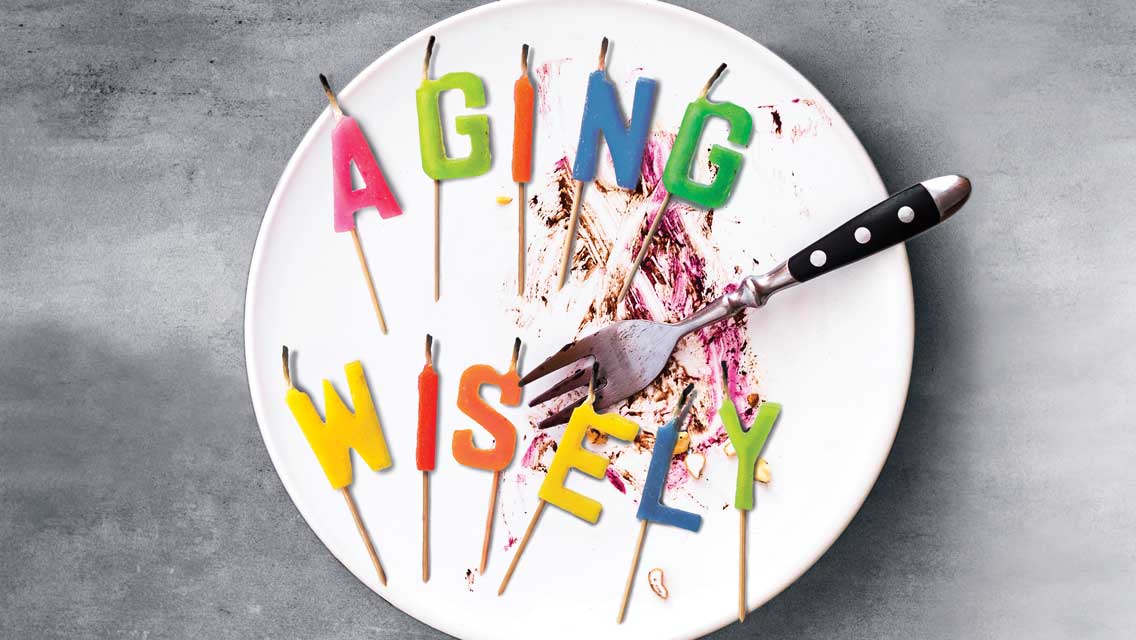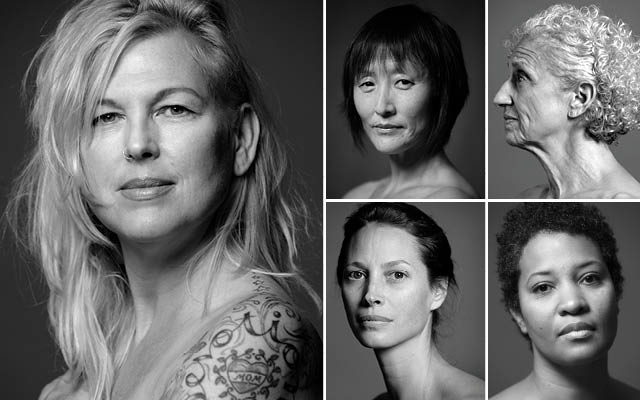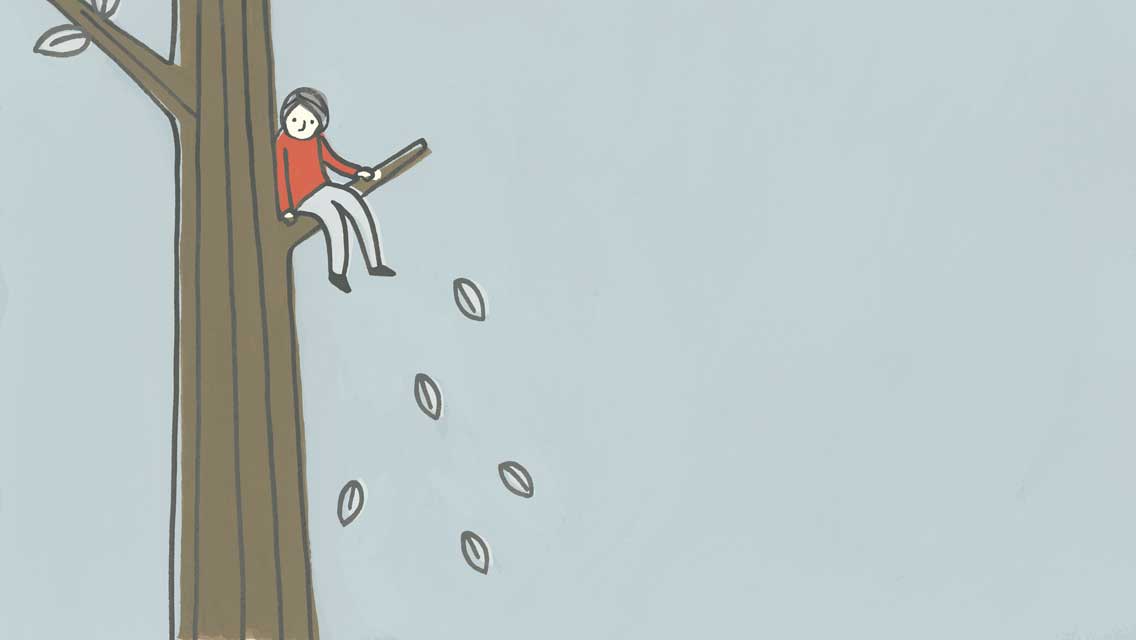I’ve always been excited about getting older. I can’t wait to grow into my prematurely silver hair and my predilection for eating dinner at 4:45. But I know I’m an outlier in my enthusiasm; the standard societal narrative around aging is not nearly so cheery.
“There’s a cultural assumption that the peak years are in the early part of adulthood,” says Jonathan Rauch, author of The Happiness Curve, “and then it’s a long, slow process of decline and decay and death.”
Indeed, for many of us, birthdays stop being fun once we’re old enough to buy beer. We stop associating them with freedom and start linking them to a vast array of bummers — ever-increasing responsibilities, regrets, and aches and pains.
But Rauch says the notion that aging involves an inevitable slide toward infirmity and mounting emotional and practical challenges is actually the opposite of the truth — at least after we pass through the well-documented midlife trough of happiness (more on that later). There are, in fact, many benefits that come with growing older, and research shows that life satisfaction doesn’t peak until our 60s or 70s.
Studies also suggest that how we think about growing older, regardless of our age, plays a critical role in how the process actually unfolds. One longitudinal analysis found that people who, as youths, associated old age with wisdom and other positive characteristics lived an average of 7.6 years longer than those expressing more negative perceptions of aging.
So there’s good reason to make your peace with growing old and to actively embrace it. Because let’s face it: Aging isn’t optional — but the attitude we bring to it is.
The Upsides of Aging
Are there skills and abilities that diminish as we get older? You bet. Your jump shot might lose some of its grace. Your days of dancing all night and then arriving bright-eyed at a morning meeting will eventually pass by. Yet, despite these shifts, there are myriad ways our minds and perspectives are enhanced by the passage of time.
1. Our brains become more adept at big-picture thinking.
Aging-related changes in the brain can diminish our ability to encode new information or retrieve existing information from the memory; at the same time, however, connections between certain areas of the brain grow stronger. These links help us get better at seeing the big picture and intuiting relationships between disparate pieces of information.
Chip Conley, author of Wisdom at Work: The Making of a Modern Elder, says these developments are part of what enables us to “grow whole” as we age. This shift toward wholeness and wisdom is emphasized in the school he founded last year, the Modern Elder Academy in Baja California Sur, Mexico.
“The aging brain is not as good at recall,” he explains. “But it is better at moving from left to right brain, so you can get the gist of something quickly. It’s better at seeing the holistic and systemic picture and therefore seeing solutions to problems.”
We also get better at managing our memory as we get older. “Short-term memory may decline, but one thing that gets better with age is metamemory,” notes Alan Castel, PhD, author of Better With Age: The Psychology of Successful Aging. Metamemory, or awareness of how one’s memory works, enables us to devise compensation tactics, like writing things down. Or practicing a name in advance when we know we’re about to see an acquaintance whose name we often forget.
Selectivity, or what we dedicate energy to remembering, also improves with age.
“Selectively focusing on what is important is critical and may actually be a skill that is enhanced in old age, as a necessary byproduct of not being able to remember everything,” says Castel. “The ability to home in on what is important and let the rest go by is something older adults do quite well.”
2. We get better at regulating our emotions.
As we get older, we tend to favor the positive over the negative. Studies have shown that older adults focus more on faces displaying positive emotions than younger people do, enjoy richer memories of positive life events than negative ones, and experience less aversion to an expected monetary loss.
“This positive focus may be a strategy that can enhance our well-being as we get older,” says Castel, noting that it often accompanies a growing sense of happiness as we age. “Older people are better able to focus on positive things, while younger people fret and worry more about life decisions.”
And it’s not just our own emotions we’re handling more adeptly. “We also get better at taking other people’s perspective and understanding how they feel,” he explains.
These are general tendencies as we age, Conley notes; they don’t necessarily arrive gift-wrapped with our AARP card. Negative attitudes about aging in the culture at large can still get their claws into us.
He suggests, however, that cultivating the mindset of what he calls a “modern elder” can move us away from aging-related anxiety and toward becoming “self-aware, patient empaths who are good at both understanding and managing their own emotions and tuning in to the emotions of others.”
3. We’re primed for wisdom.
We’ve probably all interacted with enough interpersonally challenged older people to know that age doesn’t automatically confer wisdom. It does, however, provide many of the ingredients for cultivating it.
“Other things being equal, the aging process makes it easier to be wise in later life,” says Rauch. “The way our worldviews and brains change as we age makes us better equipped for wisdom.”
As our goals and priorities change, we may become less interested in scoring points in the competition of life and more inclined toward service to others, fueled by a desire to make the world a better place. “Nature keeps us around for decades after we can no longer reproduce,” he notes, “and the reason may be that older people convey wisdom that helps the group, family, and society thrive.”
Though folklore tends to associate wisdom with wizened crones, Conley says it isn’t necessarily old age that defines a modern elder. It’s a sense of generosity and gravitas mixed with humility. He points out that a 40-year-old surrounded by 20-somethings can be an elder; she’s in a position where she can transmit her hard-won wisdom and experience.
“As we age, we are called to become more and more human,” he writes. “To a young person, it’s invaluable having an experienced guide to warn them about where invisible rocks are downstream as they make their way through the whitewater.”
The Midlife Transition
Here, dear reader, we must interrupt the promise of blue skies ahead to sound a note of caution for those who have yet to reach middle age — and perhaps a note of reassurance to those sitting squarely there.
Although the trajectory of life satisfaction is trending decidedly upward by the time we qualify for senior discounts, research shows that many of us can expect a dip in midlife, generally in or around our 40s. It’s sometimes described as a midlife crisis, but Rauch contends that, for most, it’s more of a slump or transition.
“It’s a time when you may be disappointed in the past because you feel like it hasn’t brought the happiness or fulfillment you expected,” he explains. “And you may be pessimistic about the future because you don’t see how it will get better.”
The good news is that the midlife transition primes us for the shift into the most satisfying years of our lives. Like puberty, it can be painful and awkward, as well as necessary and (mercifully) limited.
“It’s a time when the dictates of your inner wisdom come to the fore,” says Christiane Northrup, MD, author of Goddesses Never Age. “It’s sometimes described as a happiness trough, but it’s really a meaning trough. It’s a time when you have to find a deeper meaning and align with the dictates of your soul.”
Conley describes it as a time when goals and priorities shift in ways that are perfectly normal and ultimately serve us well. “The first half of life is about accumulation, and the second half is about editing,” he explains.
“The 40s can be a treacherous decade because it’s where all that accumulation of responsibilities, stuff, relationships, and identities overwhelms you,” Conley says. “In our 50s we begin to learn how to edit more prudently, and that makes us happier. We learn to focus more internally on the heart and soul, and less on the influence of the ego.”
Aim for Age Balance in the Workplace
“A lot of industries that were youth-centric are realizing that age diversity is good for business,” says Chip Conley, author of Wisdom at Work and a strategic adviser to Airbnb’s leadership team. “Diversity of gender and race have proven to be positive for organizations, and evidence shows the same is true of age diversity.”
Research has shown that older workers are more consistently productive than their younger counterparts, and teams that include older workers tend to be more productive than teams without them. Older workers may also bring a healthy sense of cooperation to the workplace.
“We tend to get more collaborative and less competitive as we age, and that’s a big positive,” says Conley. “At Airbnb [where most workers are in their 20s], everyone wanted to be the smartest person in the room. Older folks can help create a more collegial and collaborative environment.”
“Older workers have accumulated the skills to solve interpersonal problems,” says Jonathan Rauch, author of The Happiness Curve. “They help teams get along and get around impasses.”
And in a mixed-age workplace, both older and younger people benefit. “There’s good science supporting the idea that younger and older people belong together,” notes Rauch. Together they have energy and insight, a combination that neither age group is as likely to have alone.
Changing How We Age
People over 60 have a collective opportunity to create and model entirely new ways to grow older. In 1960 the average life expectancy was around 64; most of us can now expect at least a decade more, says Rauch. “These additional years are coming in the most satisfying and pro-social time of life.”
The old model of full retirement at age 65 is becoming increasingly obsolete, both because people are remaining vital and engaged substantially longer than previous generations and because few have saved enough money to navigate those extra years of life without a steady paycheck. Staying in the workforce may be a vital source of purpose and an economic necessity.
Still, for many — whether the motive is financial or not — staying employed is a way to satisfy the desire to serve. At 74, Phyllis Moen, PhD, author of Encore Adulthood: Boomers on the Edge of Risk, Renewal, and Purpose, launched the University of Minnesota Advanced Careers Initiative (UMAC). She sought to help older people figure out how to use their experience and insight to continue making meaningful contributions.
“We need to build the social infrastructure for the new demography,” Moen explains. In her view, boomers are “now the pathfinders”; they’re creating new ways of living and working in the 21st century.
A lifelong commitment to learning is one of the keys to blazing trails for others. “Being open to learning and feeling awkward is the only way to move from crawling to walking,” says Conley, noting that a growth mindset and a willingness to be a beginner are critical to evolution and vitality throughout all stages of life.
And that’s why learning from younger generations is as crucial in our older years as mentoring and coaching. Conley has dubbed this combination of teaching and learning “being a mentern,” and he acknowledges that it may not come easily to everyone.
“We’re not really wired to listen to and learn from young faces, but that’s exactly what we need to do,” he writes. “Learn, grow, teach, and then learn again. That’s what we have to offer ourselves and the world.”
Both older and younger generations benefit from this exchange. In the UMAC program, Moen places boomers and traditional undergrads in the same classes. “Each mentors the other,” she says. “When it comes to helping with a new technology, the older folks are mentored. When it comes to advice about how to succeed in a workplace, the younger folks are mentored.”
Both groups tend to share a sense of uncertainty about the future and how they’ll fit into it. “It’s a changing world, and no one can see around the corner,” she notes. “Our fellows are learning that they have to create their own encore in many ways.”
This sense of entering an unknown frontier, armed with all the strengths and benefits of a wise and experienced mind, may just describe the most exciting life phase of all. Conley encourages people to nurture their desires to experience new and unexplored territory — and resist the temptation to regress into what is comfortable and familiar.
“Aging with vitality exists when you create the perfect alchemy of wisdom and curiosity.”
Cultivate a Growth Mindset
We live in a youth-obsessed, age-phobic culture, so embracing the benefits of aging usually requires a few adjustments. These strategies can help.
Remove ageism from your language. “Ageism is one of the last socially acceptable -isms, and people have internalized it,” says Christiane Northrup, MD. “You hear people saying, ‘At my age it’s too late to try this,’ or ‘I wish I could still do that, but I’m too old.’ Nothing is more deadening! Energy flows where awareness goes.” Northrup recommends setting a timer if you need to complain about aches and pains, and using affirmations to cultivate your preferred attitudes and beliefs.
Find role models. “Name five people whom you admire for how they’ve aged, and take your pick of qualities and traits you would like to embrace in your own way,” advises Alan Castel, PhD. Role models have real power to expand our impressions of aging, dissolve stereotypes, and inspire goals.
Diversify your friends. “Get yourself into a community that’s not about your age group, but about having fun,” advises Northrup, who took up tango dancing in her 50s. “When I started to tango, no one cared about my age. They cared about whether I could dance!” Castel notes that older people with younger friends report feeling younger themselves and may be more inclined to stay physically active, to be socially connected, and to enjoy nature — all things that promote positivity and vibrant health. (For more on the value of intergenerational relationships, visit “The Value of Intergenerational Relationships.”)
This originally appeared as “Aging Wisely” in the October 2019 print issue of Experience Life.
Discover
Explore our carefully curated collection of articles that provide valuable information and tips to support you physically, mentally, and emotionally as you navigate the aging process.





This Post Has One Comment
Would be helpful to provide listing of books you reference in the article for personal development and reading please.
Thank you.